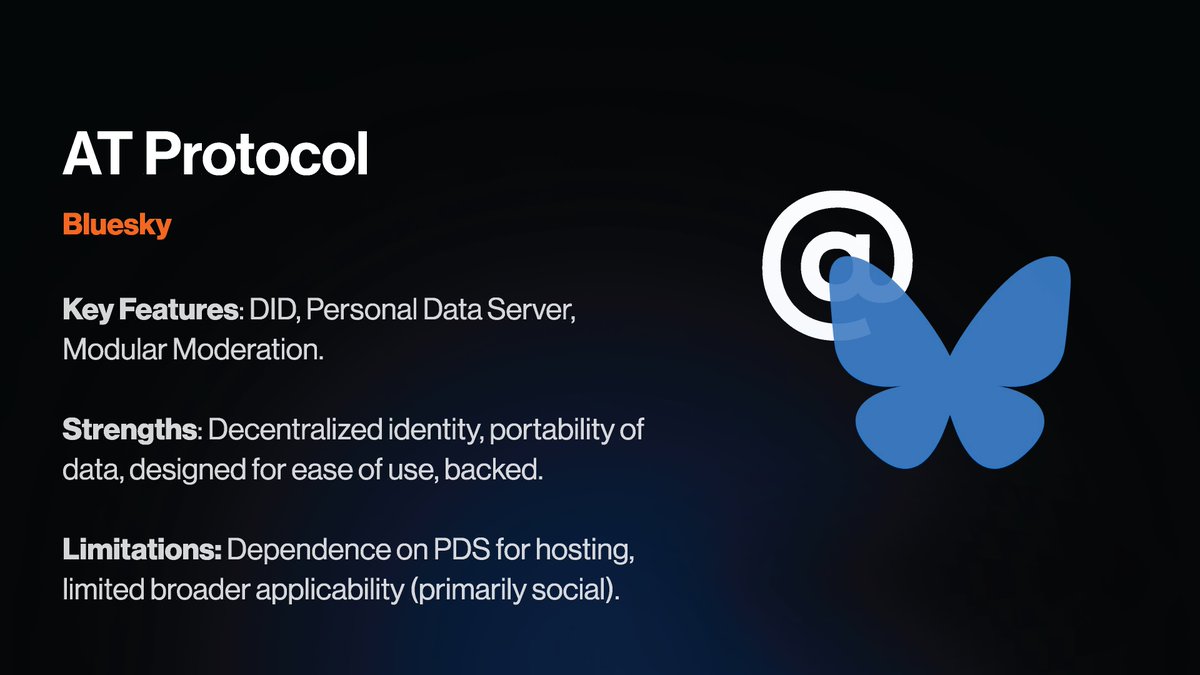For those of you that missed my presentation in Lugano, here is a tweetstorm summary and introduction to our new Pubky ecosystem.
Let's begin! 👇
Let's begin! 👇

The Problem: A Captured Web
The web today is a mess of poisoned algorithms, censorship, and walled gardens.
The web today is a mess of poisoned algorithms, censorship, and walled gardens.

🕸️ Poisoned Algorithms
Big Tech feeds you what serves them: corporate and state interests, toxic engagement, user manipulation... Algorithms are broken, and they’re breaking us.
Big Tech feeds you what serves them: corporate and state interests, toxic engagement, user manipulation... Algorithms are broken, and they’re breaking us.

🚫 Censorship
Think you’ve got free speech online? Not so fast. Platforms and governments decide what’s allowed, what’s “truth.”
The net’s compromised. It's not about what you say, it’s about what they let you say.
Think you’ve got free speech online? Not so fast. Platforms and governments decide what’s allowed, what’s “truth.”
The net’s compromised. It's not about what you say, it’s about what they let you say.

🧱Walled Gardens
Big Tech’s idea of a web? Lock you in their app, farm your data, and make you pay for the privilege.
Your data is locked up in ecosystems that serve them. It’s digital serfdom, not freedom.
Big Tech’s idea of a web? Lock you in their app, farm your data, and make you pay for the privilege.
Your data is locked up in ecosystems that serve them. It’s digital serfdom, not freedom.

Attempts to Fix the Web (So Far)
There’ve been attempts to "fix" the web, and made notable progress. Let’s talk Mastodon, Nostr, Bluesky, and where they have fallen short.
There’ve been attempts to "fix" the web, and made notable progress. Let’s talk Mastodon, Nostr, Bluesky, and where they have fallen short.

Activity Pub / Threads, Mastodon
Pros: Federated servers, community control, open-source.
Cons: Identity isn’t portable, centralized moderation doesn’t help if a server bans you. You’re still at someone else’s mercy.
Pros: Federated servers, community control, open-source.
Cons: Identity isn’t portable, centralized moderation doesn’t help if a server bans you. You’re still at someone else’s mercy.

Matrix / Element, etc
Pros: Decentralized real-time communication built to replace traditional chats. E2E encryption.
Cons: Federation still has a level of central control from larger servers. Complex infra makes it harder for users to run their own server.
Pros: Decentralized real-time communication built to replace traditional chats. E2E encryption.
Cons: Federation still has a level of central control from larger servers. Complex infra makes it harder for users to run their own server.

Nostr / Primal, Damus, etc
Pros: Key-based identity. Resistant to some censorship. Super simple to start.
Cons: Scales poorly. No identity-based routing. No real delegation options. It’s a decentralized beginning, but lack of intentional design left gaps in the system.
Pros: Key-based identity. Resistant to some censorship. Super simple to start.
Cons: Scales poorly. No identity-based routing. No real delegation options. It’s a decentralized beginning, but lack of intentional design left gaps in the system.

Bluesky (AT Protocol)
Pros: Decentralized ID & portability, theoretically good. Offers elaborate moderation options.
Cons: DID depends on PLC directory — a centralized failure point.
Pros: Decentralized ID & portability, theoretically good. Offers elaborate moderation options.
Cons: DID depends on PLC directory — a centralized failure point.

Introducing Pubky
Vision
Pubky is a key-oriented, user-controlled web. Own your data, identity, and content. Break free from Big Tech.
Pubky Core
The decentralized protocol that powers Pubky. Identity, data routing, hosting.
Pubky App
Your interface to this new web. It’s a publishing tool, a curation engine, with personalized feeds, social tagging, and curation controlled by you.
Vision
Pubky is a key-oriented, user-controlled web. Own your data, identity, and content. Break free from Big Tech.
Pubky Core
The decentralized protocol that powers Pubky. Identity, data routing, hosting.
Pubky App
Your interface to this new web. It’s a publishing tool, a curation engine, with personalized feeds, social tagging, and curation controlled by you.

PKARR (Public Key Addressable Resource Records)
You hold the keys to your digital kingdom.
Your identity, data, and contacts are portable and censorship-resistant.
Your key is your uncensorable domain name.
You hold the keys to your digital kingdom.
Your identity, data, and contacts are portable and censorship-resistant.
Your key is your uncensorable domain name.

Mainline DHT
Think BitTorrent tech, but for the web.
Decentralized peer discovery that scales.
20 million nodes. Global, resilient. Real P2P.
Think BitTorrent tech, but for the web.
Decentralized peer discovery that scales.
20 million nodes. Global, resilient. Real P2P.

Homeservers
No lock-in, no walls. Anyone can run a homeserver. The same UX as "Log in with Google" — but with true freedom and control over sessions.
If your server bans you? Move. Carry on.
No lock-in, no walls. Anyone can run a homeserver. The same UX as "Log in with Google" — but with true freedom and control over sessions.
If your server bans you? Move. Carry on.

A Credible Exit
No one should control your social graph, data, or reputation but you.
With Pubky, you take it all with you.
Migration is built-in. True resilience and availability, built for users.
No one should control your social graph, data, or reputation but you.
With Pubky, you take it all with you.
Migration is built-in. True resilience and availability, built for users.

HTTP-friendly URLs
Not everything has to be some blockchain acronym.
Pubky is practical: normal HTTPS URLs, seamless integration, and a focus on usability.
Not everything has to be some blockchain acronym.
Pubky is practical: normal HTTPS URLs, seamless integration, and a focus on usability.

Pubky Core Is Available Now
This isn’t vaporware. We’re open source, and we’re live.
Contribute to Pubky Core: github.com/pubky
This isn’t vaporware. We’re open source, and we’re live.
Contribute to Pubky Core: github.com/pubky

I will have to do a separate thread for the rest, tune in to learn about Pubky App!
• • •
Missing some Tweet in this thread? You can try to
force a refresh


















